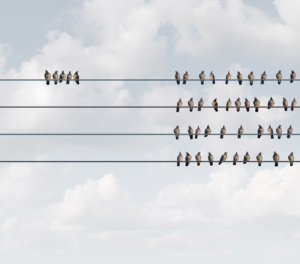Disinformation and Why it Sticks Around
May 25, 2022
 Many of us are dealing with disinformation. We have family members who are strident about a belief we think is insane. Our politics are at the breaking point due to the taking of sides about what is true and what is not. Rather than dissect all of that, I am curious about why this is happening in the first place.
Many of us are dealing with disinformation. We have family members who are strident about a belief we think is insane. Our politics are at the breaking point due to the taking of sides about what is true and what is not. Rather than dissect all of that, I am curious about why this is happening in the first place.
My investigation into the cultural impact of pandemics makes this an interesting topic for me. And being an avid sports fan, I began to see something that fascinates me. I know from my long history of being a sports fan that fandom is a deep, cultural deal for many people. We root for our team, we deny there is any team better than ours (they were lucky!), and we love our team even when they are struggling. People become violent with others who root for another team, and families can get torn apart by which side you root for.
The pandemic isolation caused many of us to form pods of information with friends, commentators, and news outlets making sure the reports and conversations fit into the current conversations in those pods. It has become a sort of weird belonging, believing what our peers are believing. And it feels wonderful to be fighting a large, invisible enemy, together with our pod. The problem is, the need to belong is essential to human nature. So having people even consider that what we believe might not be true shakes us so deeply we dismiss the idea out of hand.
What is the fix for this?
No more isolation, for sure. It is at this very divided point that we must figure out how to connect, not divide. Can we understand their point of view, beyond the rhetoric? Can we love them for the part of them that is lovely? (Everyone has a lovely or charming part!) Can we be open enough to offer belonging on a broader scale so that people don’t have to choose sides? This is the secret to all good relationships, by the way. There is no such thing as someone we always agree with, or who is perfect. We must make room for differences of opinion to be neutral, not so charged. And we must make room for mistakes to be forgivable, not deadly.
One of the most amazing experiments in this approach to difference and disinformation is with gangs. Gangs offer belonging at a high cost, but when it is the only place offering belonging, there are many takers. And what one gang belongs to is not remotely what another gang belongs to. The penalty for making a mistake about that is often death.
Over the past 30 years, Father Greg Boyle has transformed thousands of lives through his work as founder of Homeboy Industries, the largest and most successful gang-intervention program in the world. With Kinship as the mission, Homeboy offers belonging to all who would join the community. They enter a world where they work side by side with their rivals, and learn that kinship supersedes gang rules. And they relax. The transformative power of tenderness is proof in this long-term community that the power of our hearts might be the only thing that can dispel disinformation.
Try this experiment
So, as you go forth, try this experiment. Give up judging and criticism for one day a week. You don’t have to agree, just be neutral and curious. Be tender first. And don’t take anything they say to you personally. You may find that the rigidity around us begins to soften, and that your own confidence increases. Wouldn’t that be lovely? And try having some compassion for how deeply people long to belong together. And see if you can invent new ways for that to happen.
If you want to know more about Homeboy Industries, please go to their website. I also highly recommend the books authored by Father Greg Boyle, Tattoos on the Heart, Barking to the Choir, and The Whole Language. Each is more spectacular than the next, and your heart will swell at the model of humanity at its very best.
If you like this blog, please visit my other articles here.
